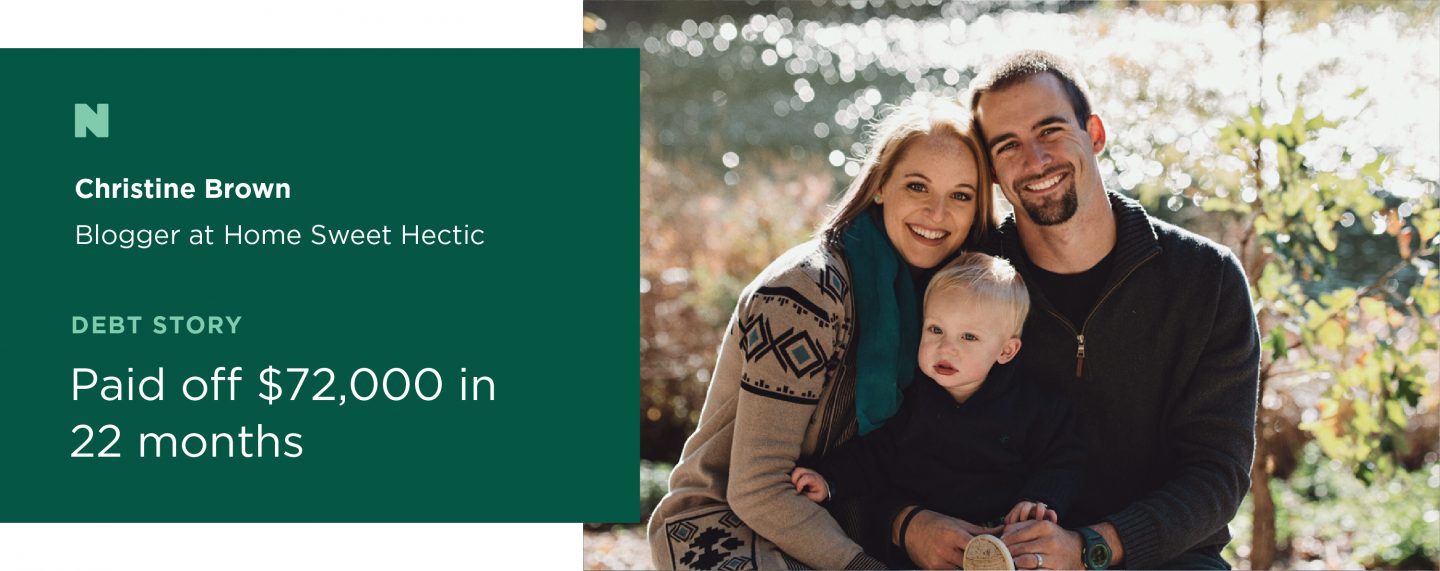In this series, NerdWallet interviews people who have triumphed over debt using a combination of commitment, budgeting and smart financial choices. Responses have been edited for length and clarity.

One night in February 2016, Christine Brown and her husband, Corbin, added up all of their debt. The results were alarming — and left Christine in tears.
“I was terrified we would not be able to properly provide for our son, or have more children because of the cost of raising a family,” she says.
“It scared me into action.”
A combination of student loans, a car loan, credit card debts and home improvement financing left the couple $72,000 in debt. Relying mostly on Corbin’s teaching salary of $40,000 a year — which increased to $54,000 after Corbin took a new teaching position eight months into their debt-free journey — the Browns recalibrated their needs and wants and created a budget they followed religiously.
“I became a real stickler with the budget,” Christine says. “I am somewhat obsessed with being under budget in each category, and I’ve found many ways to save money.”
Now free of high-interest debt and a mom to two boys, Christine blogs about her journey at Home Sweet Hectic. She recently connected with NerdWallet to share her story, which may inspire your own debt-free journey.
Track your debt the easy way
Sign up with NerdWallet to see your debt breakdown and upcoming payments all in one place.
What was your total debt when you started your repayment journey?
We began our debt payoff in February 2016 with $72,000 in debt. We had student loans totaling $49,000 that we used for graduate school, a $12,000 car loan, an $8,000 loan we took out from Wells Fargo to have our windows replaced, and $3,000 in credit card debt.
How did you end up in debt?
Our first debt came from leasing my husband’s car during his second year of teaching. We also decided I should go to graduate school for a counseling degree. We took out loans for that instead of paying cash.
What triggered your decision to start getting out of debt?
One evening, we realized we were hemorrhaging money. I had been laid off from my job providing academic support services to students with disabilities at a local community college six months prior and was staying home with our son. We were living paycheck to paycheck and spending money on wants as well as needs. That was the night we added up all of our debts.
What steps did you take to reduce your debt? What resources or services did you use?
We sold our house and used part of the proceeds to pay off about half of our debt. The other half went toward buying our current home, which we bought with help from family members who gave us a 0% loan for the house.
My husband had also been trying to get me on board with [financial advisor and author] Dave Ramsey’s debt snowball plan for a while, and I finally hopped on. We listed all of our debts from smallest to largest and attacked the little one while making minimum payments on the rest.
And we began budgeting. We focused on our needs instead of our wants and learned to say “no” to treating ourselves. It was a work in progress, and we still slip up. Using the EveryDollar budgeting app has been huge for us because we now pay close attention to where our money goes. It keeps us accountable.
We also canceled cable, which freed $1,500 a year to put toward debt. We don’t miss it at all!
What resource do you wish you’d had when you were paying off debt?
I wish we had started using EveryDollar sooner. We were tracking our budget with pen and paper, and it was easy to ignore transactions. EveryDollar made it easy to record every single transaction immediately after purchase.
I also wish we had more support from friends. Many knew what we wanted to accomplish, but they told us it wasn’t possible to live without debt. I think having more support and motivation would have allowed us to reach our goal faster than 22 months.
How did your debt journey affect your personal relationships?
Working toward our goal strengthened my relationship with my husband. It improved our communication, and we held each other accountable for our spending.
My parents were supportive. They’d never lived with debt, so they thought it was great for us to pursue this. Two of my three siblings were supportive, but one of my sisters didn’t think we were actually putting in the legwork. That was hard to take. We live in an area with a low cost of living and had my in-laws nearby for child care, but we accomplished it on just my husband’s teaching salary.
What was your biggest hurdle you had to overcome?
Our biggest chunk of debt was my student loans from grad school, and not seeing that balance move a lot because of accumulating interest was the hardest part for me.
As a couple, it was sticking to a budget and saying “no” to things. We enjoyed going out to eat and hanging out with friends. It was challenging to tell our friends we couldn’t do that as often.
We tried hard to save gift cards and go out every once in awhile. We also have friends over to our house. It’s still possible to be social without spending a lot of money.
Any thoughts for those who may be struggling with splitting needs versus wants?
My biggest piece of advice is make sure you’re working toward a bigger goal. Everything you’re doing is for that greater good, both for yourself and your relationships. Think of it as delayed gratification — your “wants” can come back into play once the debt is gone.
How has your life changed for the better since you got out of debt?
I now have confidence that our children’s futures are secure. Not only are we able to provide the necessities of life, but we can also provide further education for them without having to put ourselves or them into debt.
We no longer stress out about whether there will be money left at the end of the month because we know there will be. We can also save for “wants” and enjoy them more when we pay cash.
How do you manage your debt today?
We have a monthly house payment, but it’s the last loan we will ever take out. It will be paid off within seven years.
The biggest tool for remaining debt free, in my opinion, is learning how to be content and grateful for what you have. We have decided that we’ll never take out another loan and only live within our means. We save for home renovations and a car. We hold each other accountable and set financial goals so we have something to strive for.
What are your financial goals now?
Right now, we are building an emergency fund, and we hope to reach that goal by the end of the summer. And we’re saving for a new car — mine is 12 years old. Oddly, I’m excited to get a minivan. I swore I would never drive a minivan, but SUVs are far more expensive and have less space.
We’re also saving for preschool for my oldest son and a family vacation to Florida. We haven’t been on a real vacation since our honeymoon, 5 1/2 years ago.
How to tackle your debt
Inspired by the Browns’ debt-free journey? Here’s how to start your own:
- List your debts and decide on a payment plan. You can use the debt snowball approach — paying off smaller debts first — or the debt avalanche, which prioritizes paying off high-interest debt.
- Analyze your monthly spending habits and make a budget to help keep you on track.
- If you’re struggling with multiple debt payments, consider consolidating your debt.
This post has been updated to include clarifying information.



